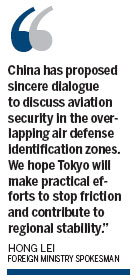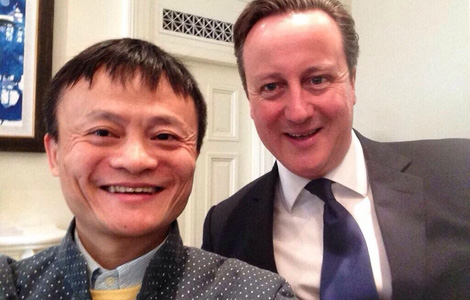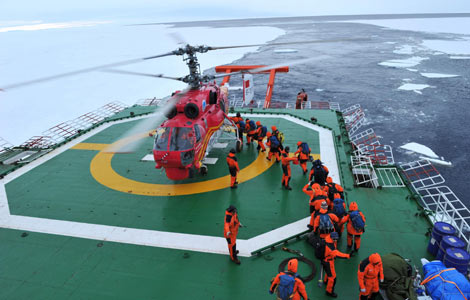Air zone shadows Biden trip
Updated: 2013-12-04 11:41
By Pu Zhendong in Beijing and Cai Hong in Tokyo and Chen Weihua in Washington (China Daily USA)
|
||||||||
China's air defense identification zone (ADIZ) in the East China Sea promotes "safety instead of danger, cooperation instead of confrontation", Chinese officials said in response to objections from Japan and the United States.
China's Ministry of National Defense spokesman Geng Yansheng said on Tuesday that Japan needs to reflect on its own actions and correct its mistakes, while other parties should speak and act cautiously so as not to send signals that might fuel Tokyo's wrongdoing.
He made the remark after Japanese Prime Minister Shinzo Abe said on Tuesday that Tokyo and Washington confirmed their cooperation on how to handle the air zone during talks with visiting US Vice-President Joseph R. Biden Jr.
Biden called China's air zone "an attempt to unilaterally change the status quo" and said that he will raise US concerns when he meets with Chinese President Xi Jinping later this week in Beijing.
He said the declaration of the zone has raised regional tensions and increased the risk of accidents and miscalculation.
Geng said Tokyo is not qualified to make remarks about China's "reasonable and lawful" establishment of the zone. He said the Chinese military is determined and capable of conducting effective supervision of the zone.
Foreign Ministry spokesman Hong Lei said that China is not the one that has aggravated tensions and China objects to the fact that some countries are seizing on and exaggerating the matter for their own interests.
Biden arrived in Tokyo late on Monday. His weeklong trip in East Asia will also take him to China and South Korea.
Experts said that the air zone issue may overshadow the US' intention of focusing on economic affairs during the trip.
Jin Canrong, a professor of international studies at Renmin University of China, said the absence of a joint statement, which was pursued by Tokyo, showed that Washington is now leading the current situation and is unwilling to be hijacked by the Japanese agenda.
Washington's policy regarding this issue shows its diplomatic pragmatism, Jin said.
"Politically, the White House objects to the zone. Militarily, the Pentagon not only objects to it, but is also trying to seek a breakthrough. But on the civilian level, the US wants to cooperate with China in order to avoid economic damage," he said.
Niu Xinchun, a senior expert at the China Institutes of Contemporary International Relations, said that the US and Japan have overlapping interests in terms of their discontent with China's air zone.
"However, Washington disagrees with Tokyo in playing up regional tensions by exaggerating the threat of the zone, which in fact has been an international practice," he added.
Hong said the zone, in line with international law and not targeting any specific country, will not affect the freedom of flight in the airspace.
So far, more than 55 airlines from 19 countries and three regions have reported their flight plans to the Chinese authorities, according to the spokesman.

Biden called on Beijing and Tokyo to establish crisis-management and confidence-building measures to lower tensions.
"I will reaffirm the strength of our alliance commitments and emphasize the importance of avoiding actions that could undermine peace, security and prosperity in the region," Biden told the Japanese newspaper Asahi Shimbun ahead of the tour.
Bonnie Glaser, senior advisor for Asia at the Center for Strategic and International Studies, believes that the ADIZ issue should be at the top of Biden's visit. She described China's move as one that increases tensions in Northeast Asia.
"I expect Vice-President Biden will express the view that China's announcement is inconsistent with its stated desire for a new type of major power relations with the United States," she said.
Susan Shirk, former assistant secretary of state for East Asian and Pacific affairs and current professor at the University of California in San Diego, expressed her puzzlement over the timing of the ADIZ announcement, which came shortly after China rolled out its ambitious new reform agenda.
But she hoped that Biden would not allow the ADIZ to dominate completely his conversation with President Xi Jinping. "President Xi told Treasury Secretary Jacob Lew on the day following the CCP (Chinese Communist Party) Central Committee reform decision that he wanted this reform agenda to provide new opportunities to strengthen relations with the US," Shirk said in her article for the Asia Society's ChinaFile website.
White House officials earlier have also stressed that Biden's trip to China is not for one issue, but will cover broad bilateral, regional and global issues.
Shirk said Biden is the American political figure who has spent the most time with Xi and has the deepest understanding of Xi as an individual.
"This personal relationship should enable Biden to draw out Xi to explain what his intentions are on all fronts, including not only the Air Defense Identification Zone in the East China Sea, but also the ambitious reform agenda he laid out at the CCP Central Committee meeting in mid-November," she said.
Chen Jia and Mo Jingxi contributed to this story.
Contact the writers at puzhendong@chinadaily.com.cn, caihong@chinadaily.com.cn and chenweihua@chinadailyusa.com
(China Daily USA 12/04/2013 page1)
- Facts for Biden's reference
- China justifies its air defense identification zone
- ROK seeks talks with China, US on air defense identification zone
- Air zone 'not aimed at civilian flights'
- Foreign planes identified in China's air defense identification zone
- Japan must see air zone is about safety: experts
- Air zone 'not aimed at civilian flights'

 Cameron shows table tennis skills in China
Cameron shows table tennis skills in China
 Deck the White House halls
Deck the White House halls
 China puts simulation models moon rover on market
China puts simulation models moon rover on market
 Tourism not affected, says Thai envoy
Tourism not affected, says Thai envoy
 Debate over accident shows 'crisis of trust', experts say
Debate over accident shows 'crisis of trust', experts say
 Cities struggling to enforce bans on smoking in public
Cities struggling to enforce bans on smoking in public
 Cameron posts selfie with Jack Ma
Cameron posts selfie with Jack Ma
 Antarctica at last
Antarctica at last
Most Viewed
Editor's Picks

|

|

|

|

|

|
Today's Top News
Japan launches security council
Dialogue 'key to relations'
Value-added tax reform expands
China eyes high-level FTAs network
Huawei putting US on hold
Air identification zone shadows Biden trip
Detroit eligible for bankruptcy
Chinese realtor endows Harvard
US Weekly

|

|






